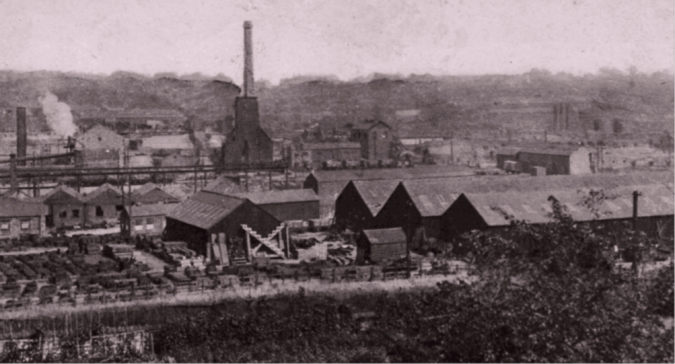

Newton, Chambers & Company, more often referred to simply as ‘Newton Chambers‘ was a nationally significant industrial concern, employing thousands of staff in South Yorkshire for over 170 years.
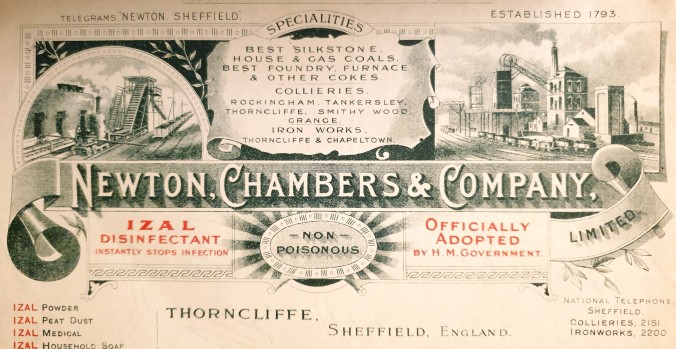
Printed letterhead, dated 1915
Based at Thorncliffe, near Chapeltown, just up the Sheffield Road from Hoyland, the company was established as a series of partnerships at the end of the Eighteenth century, developing its interests in ironworks, engineering, collieries and later chemicals from bye-products.
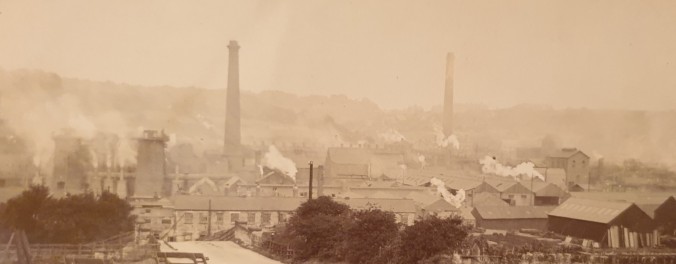
Thorncliffe Ironworks. Early 20th Century view (Private Collection, no reproduction without permission)
The company’s scale of operations declined after the Second World War as the coal and steel industries were nationalised, though the chemical and engineering departments were still profitable. The loss-making iron concern was closed in the 1970s, before it was taken over by Central and Sheerwood PLC, a holding company who were themselves taken over by Transfer Technology Group PLC which divided up its various interests, in the 1980s and early 90s, but is no longer active.
A number of descendent business interests and brands of Newton Chambers can still be traced, however, including Ronseal, Trianco heating products, NCK cranes, and others. The Thorncliffe heaquarters of Newton Chambers is now Thorncliffe Business Park.
Origins
In December 1792 George Newton (1761-1825) and Thomas Chambers (1745-1817) formed an iron business, in partnership with London Tea Merchant Miles Maskew (1752-1823) who provided the necessary financial backing for the new company.
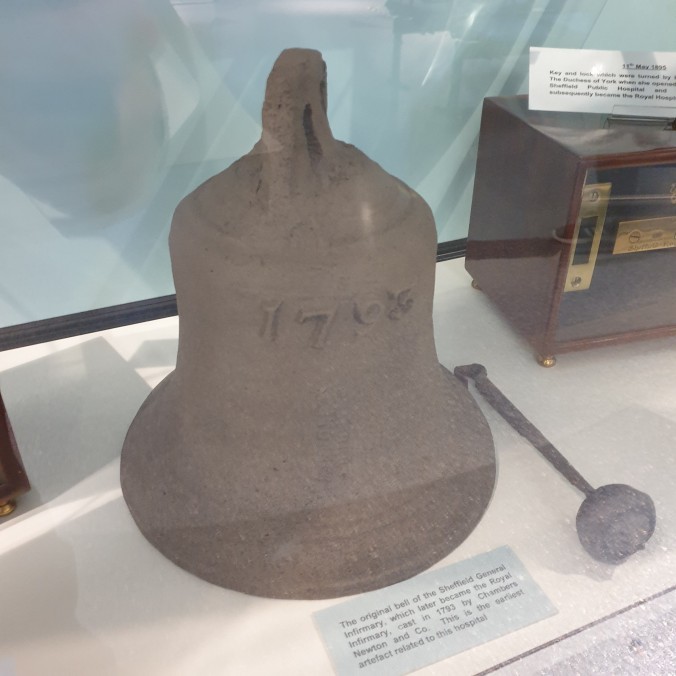
A very early product from Chambers, Newton & Co. A bell for the General Infirmary, Sheffield, 1793 (now on display in the Royal Hallamshire Hospital)
The partners rapidly began their new business with works at the Phoenix Foundry, Sheffield, which went into production casting iron goods in March 1793.
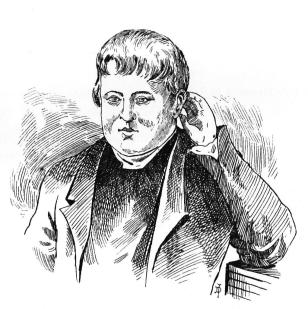
George Newton (1761-1825), from Habershon, Chapeltown Researches, p.144
George Newton was born at Staindrop in County Durham in 1761. After completing an apprenticeship in the North of England, he moved to London to work as a commercial clerk for Miles Maskew at the house of Hetherington & Maskew, Tea Merchants. Later he moved to Sheffield to join his brother-in-law, Charles Hodgson (1752-) in a company as shovel-manufacturers, ironmongers and hardwaremen which was first established at Workhouse croft near to the Queen’s foundry, and then at Pond Hill. Their partnership ended in January 1794, as Newton decided to commit to his growing foundry and wider trade business with Thomas Chambers.
Thomas Chambers was born at Rawmarsh in 1745. As a young man he worked for the renowned iron founding business of Samuel Walker & Co. in Rotherham. An experienced practical iron worker, he later moved to join a business at the Queen’s Foundry, Paradise Square in Sheffield, in partnership with James Smith, John Stacey, John Darwin, Richard Morton and John Thompson. He finally left Smith Stacey & Co. in January 1793 to pursue his new business with George Newton.
Thorncliffe
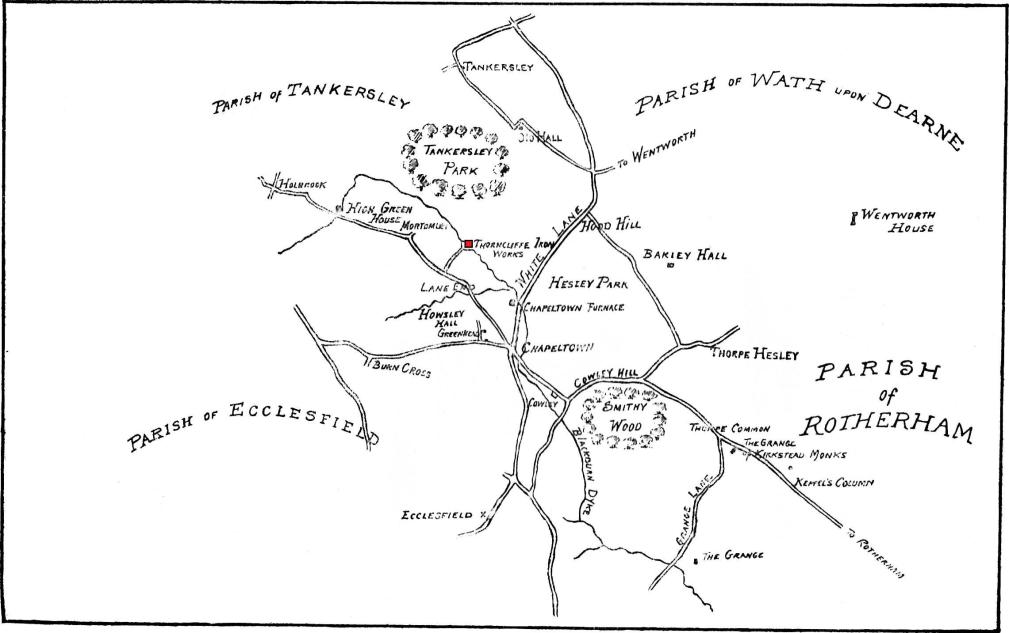
Sketch map of the area around Thorncliffe Iron Works (indicated in red), taken from Habershon, Chapeltown Researches
In December 1793 Newton and Chambers were ambitious to expand their business, approaching Earl Fitzwilliam’s agent Charles Bowns to enquire about a lease for land on which to erect a blast furnace, and also terms for the supply of the raw materials and fuel – ironstone and coal. Thorncliffe was the site decided upon, and the terms were favourable, as the local press reported a hundred years later:
“Being desirous of commencing the manufacture of pig-iron, for which there was at the time a great demand, these two gentlemen acquired the present site of the works on a twenty-one year lease. The following were the terms agreed to, viz., £70 per acre for the 2 feet 6 inch bed of coal, £90 per acre for the 5 feet seam, and £140 per acre for the ironstone. Mr [Joseph] Hague, who up to that time had acted as steward of Westwood Colliery, near Tankersley, was engaged as foreman, and on New Year’s Day 1794, active operations were begun, and on April 27, 1795, the first furnace was put into blast.”
‘Centenary of Thorncliffe Ironworks and Collieries’, The Iron and Coal Trade Review, Vol.XLVIII, No.1349, 5th January 1894, p.13
Business connections
These developments came just as the country entered a period of economic stagnation as the Napoleonic wars with France began. Under pressure from his own partner in London, Miles Maskew had to withdraw, leaving Chambers and Newton in need of new partners and additional capital. This want was met by Henry Longden (1754-1812), funded by his uncle John Turner from Sheffield.
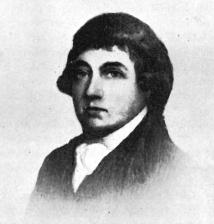
Henry Longden (1754-1812) from Habershon, Chapeltown Researches, plate between pp.146 & 147
The Phoenix Foundry, at Furnace hill in central Sheffield became less important as the Thorncliffe collieries, ironstone workings and blast furnace operations were being developed. In 1800 George Newton moved his family from Sheffield to Chapeltown to be nearer the new works, and by April 1802 the Phoenix foundry was no longer required.
The name of the partnership varied as the capital demands ebbed and flowed and new partners were sought or chose to depart. Longden, Newton and Chambers became Longden, Newton, Chambers & Scotts as Robert Scott and John Scott, London merchants joined the business, and provided further means to extend operations. Longden withdrew in 1811, when the company became Newton, Scott, Chambers & Co. though Longden’s son remained engaged in the works. John Scott’s share was bought out by his brother Robert Scott.
Family
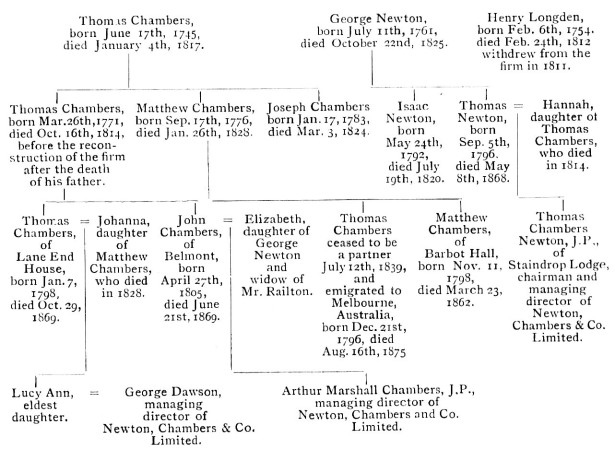
Habershon, Chapeltown Researches, p.145
The death of Thomas Chambers in 1817 brought a second generation of Chambers into the business with his second son Matthew Chambers (1776-1828).
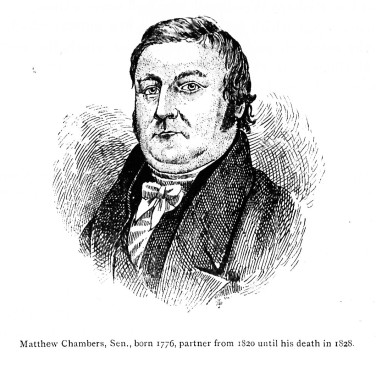
Matthew Chambers (1776-1828), from Habershon, Chapeltown Researches, p.199
Thomas’s eldest son, another Thomas, had pre-deceased him in 1814 which led to the third generation Thomas Chambers (1798-1869) and his brother John Chambers (1805-1865) being brought into the business, though full partnership status would only come in the future.
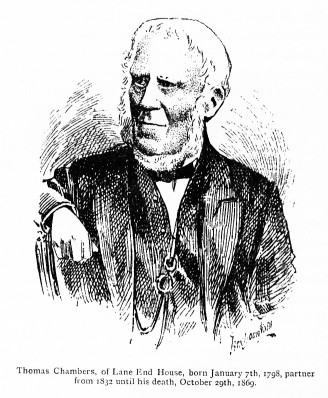
Thomas Chambers (1798-1869, grandson of the first Thomas), from Habershon, Chapeltown Researches, p.204
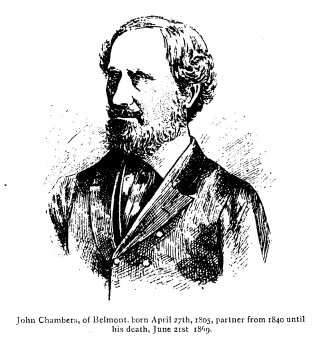
John Chambers (1805-1869), from Habershon, Chapeltown Researches, p.207
George Newton’s own sons Isaac Newton (1792-1820) and Thomas Newton (1796-1868) also assisted in the management at Thorncliffe at that time.
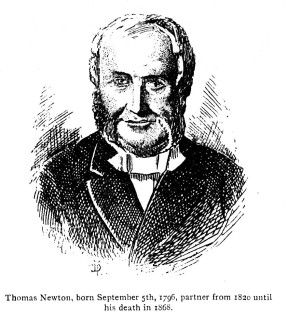
Thomas Newton (1796-1868), from Habershon, Chapeltown Researches, p.201
A new partnership was signed in 1820, along with a new 21 year lease from Earl Fitzwilliam, but the company’s arrangements were severely disrupted by a tragic casting accident when Isaac Newton (1792-1820) and eight of the casting workmen were killed.
The original founding partner, George Newton (1761-1825), died in October 1825. Founder Thomas Chambers’ surviving sons also passed away around this time:
- Joseph Chambers (1783-1824) who died with no family;
- Matthew Chambers (1776-1828) who left two sons:
- Thomas Chambers (1796-1875) and Matthew Chambers (1798-1862)
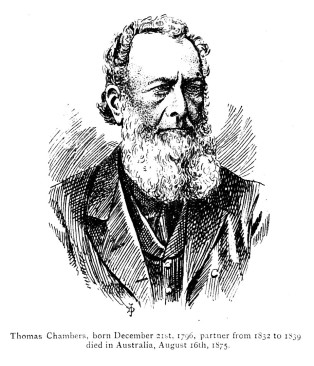
Thomas Chambers (1796-1875, emigrated to Australia), from Habershon, Chapeltown Researches
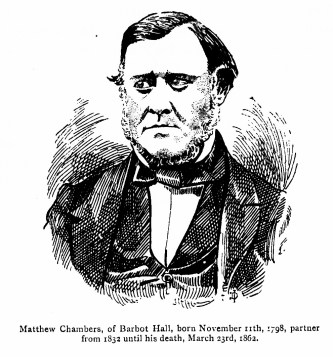
Matthew Chambers (1798-1862, youngest son of Matthew and grandson of founder Thomas), from Habershon, Chapeltown Researches, p.209
At this point the partnership was in flux, as John Scott, the financial backer from London, then in his seventies, wished to withdraw the value of his shares from the concern. The parties disagreed on the valuation of their respective shares, and arbitration followed after legal proceedings has been commenced.
In 1831 the old partnership was dissolved, and a new company, Newton, Chambers & Co. was established, consisting of:
- Thomas Newton (1796-1868, son of founding partner George Newton)
- Thomas Chambers (1798-1869, son of Thomas, grandson of the founding partner Thomas Chambers)
- Thomas Chambers (1796-1875, son of Matthew)
- Matthew Chambers (1798-1862, son of Matthew)
They were joined by John Chambers (1805-1869), brother to Thomas Chambers, the son of Thomas Chambers, and grandson of the founding Thomas.
From this period until 1881 when the partnership interests were turned into a limited liability company, the families ruled the business, expanding the blast furnaces, and sinking and acquiring additional colliery workings, at Tankersley, Thorncliffe, Rockingham, Grange and Smithywood Collieries.
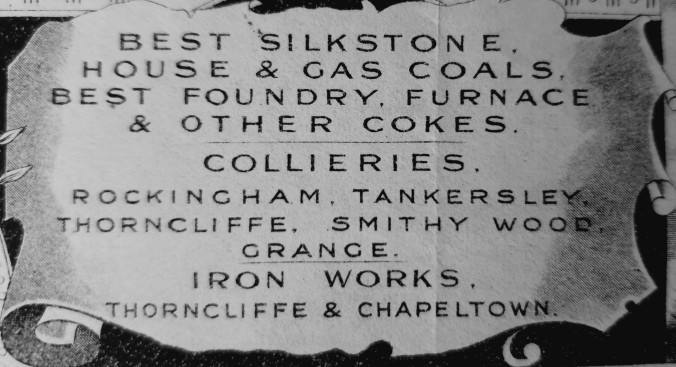
Detail from an illustrated billhead from 1915, listing ironworks and collieries
At this time George Dawson (1831-1908) became the Managing Director of the company. He had been a partner since 1869, marrying into the Chambers family after a successful commercial career with the firm.
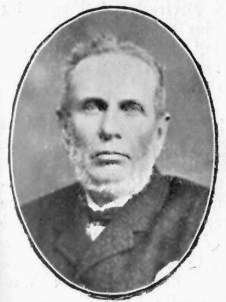
George Dawson (1831-1908), Managing Director of Newton & Chambers Co. Ltd., 1881-1908

Newton, Chambers and Company, Limited was registered on 24th October 1881 to take over the Thorncliffe ironworks and group of collieries, including freehold estates of about 200 acres, and about 4,000 acres held on lease. The authorised capital was £650,000.
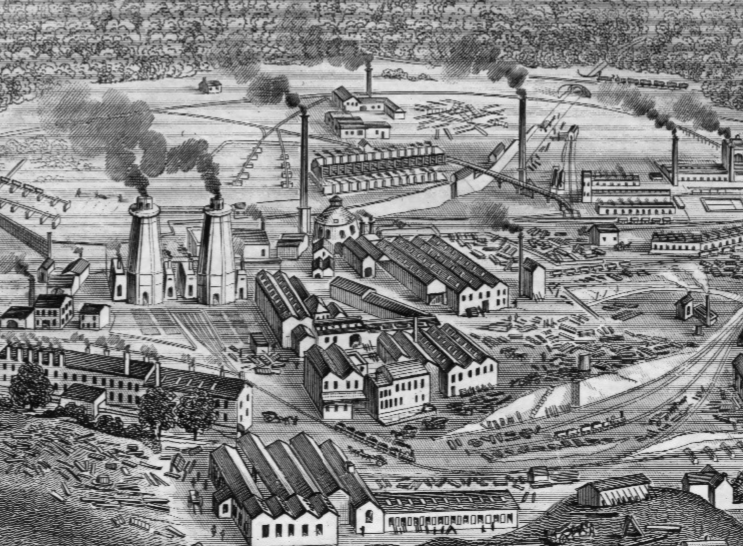
Detail from 1880s advertisement showing a view of the Thorncliffe Works (Private Collection)
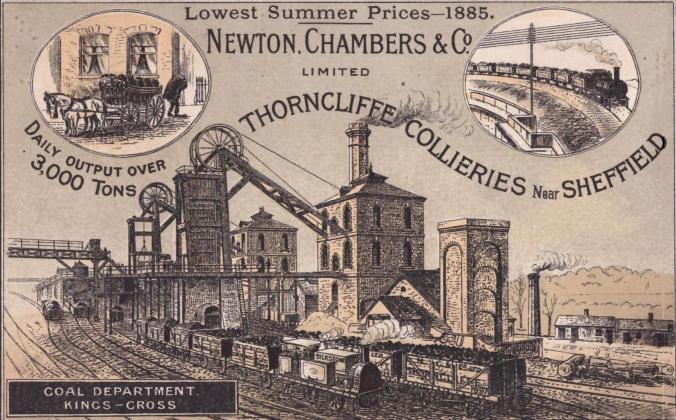
Newton, Chambers & Co. colliery advertising card, 1885 (Private collection)
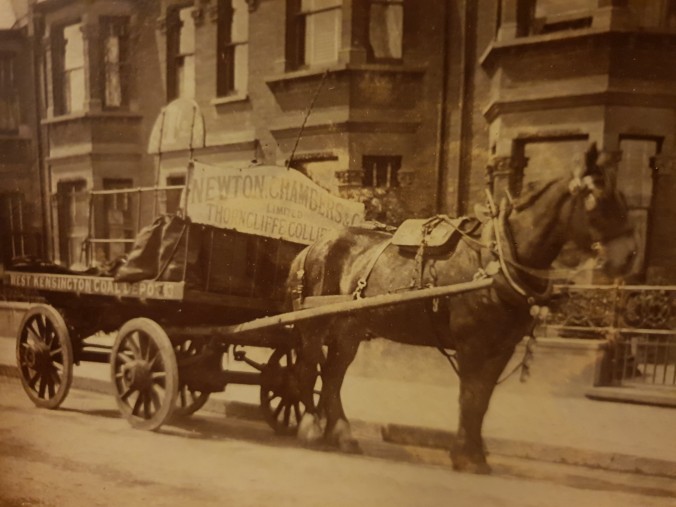
Coal delivery cart for Thorncliffe Collieries’ coal in London (Private Collection)

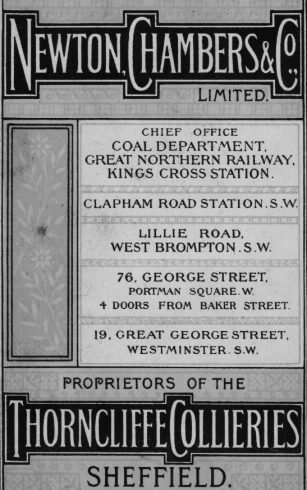
Supplying London: Thorncliffe Collieries advertising for Newton and Chambers Ltd in 1880s (Private Collection)
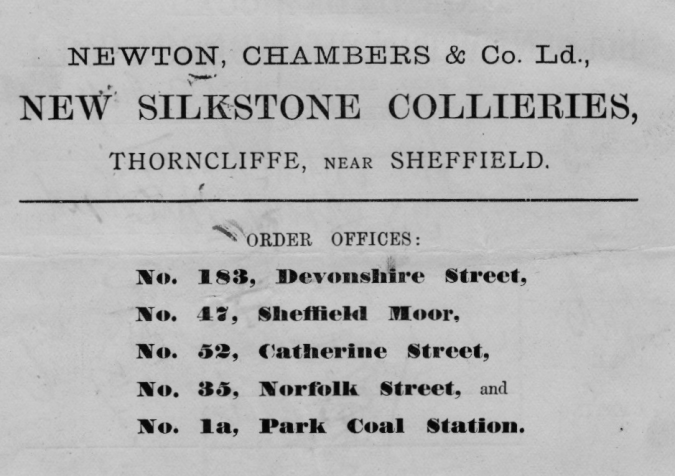
Supplying Sheffield and South Yorkshire: Newton Chambers agencies for coal (advertising on reverse of a coal receipt from Park Station Depot, 1888)
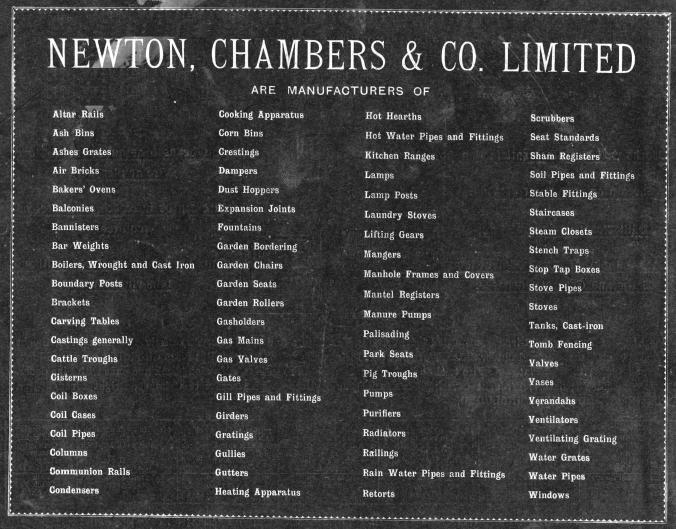
Manufactures, from Newton Chambers trade catalogue of May 1903 (Private collection)
References
[Elliott, Harold Edgar (1889-1963) ed.] Thorncliffe – a short history of Newton Chambers and Co. Ltd. and its people (serialised history published in Thorncliffe News in the 1950s)
Habershon, Matthew Henry (1821-1910), Chapeltown Researches, archaeological and historical; including old-time memories of Thorncliffe, its ironworks and collieries, and their antecedents, Sheffield & London, Pawson and Brailsford/Simpkin & Marshall, 1893
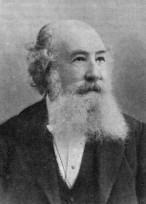
Matthew Henry Habershon (1821-1910), from Ivanhoe Review, Vol.I, No.8, August 1898, p.96
Matthew Henry Habershon married into the Chambers family, and was part of the noted Habershon family with iron and col interests in Rotherham and around South Yorkshire. His writings provide a very useful insight into the development of the Newton, Chambers and Co. company.